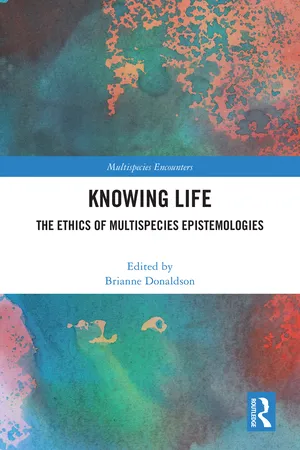
- 400 pages
- English
- ePUB (mobile friendly)
- Available on iOS & Android
About this book
Knowing Life examines the limits of dominant knowledge forms that contribute to current practices negatively affecting more-than-human beings, while also exploring alternative approaches to knowing that are capable of reducing harm and maximizing planetary thriving.
Specifically, this volume seeks multispecies answers to long-standing questions in Western philosophy: Who or what counts as a knower? What kinds of knowing are valid? Is knowledge a product of mind, body, or something else? Historically, these epistemic questions have been answered in ways that neutralize the knowing and knowledge contribution of and for more-than-human beings, as well as those on the margins of society considered less than "human." Consequently, these epistemic assumptions often support the destruction of ecological habitats, industrialization of food animals, widespread use of insect and plant toxins, water and air pollution, climate extinctions, ecological militarism, and the perpetual flow of living beings used for entertainment, research, clothing, companionship, and economic resources.
In this book, crosscultural and multidisciplinary contributors—including lesser-known global religious-philosophical accounts, philosophies of plant and insect life, race and disability studies, laboratory epistemology, embodied semiotics, and scholar-artists—challenge and expand these classical concepts through diverse modes of embodied engagement on multispecies knowing toward open futures of planetary co-flourishing.
Frequently asked questions
- Essential is ideal for learners and professionals who enjoy exploring a wide range of subjects. Access the Essential Library with 800,000+ trusted titles and best-sellers across business, personal growth, and the humanities. Includes unlimited reading time and Standard Read Aloud voice.
- Complete: Perfect for advanced learners and researchers needing full, unrestricted access. Unlock 1.4M+ books across hundreds of subjects, including academic and specialized titles. The Complete Plan also includes advanced features like Premium Read Aloud and Research Assistant.
Please note we cannot support devices running on iOS 13 and Android 7 or earlier. Learn more about using the app.
Information
Table of contents
- Cover
- Half-Title Page
- Series Page
- Title Page
- Copyright Page
- Dedication
- Table of Contents
- Author Biographies
- Acknowledgments
- Introduction: From the Limits of Intelligibility to Perceptive Rearrangements
- Section I Living Concepts
- Section II Growing Perceptions
- Section III Freeing Subjectivities
- Section IV Experimental Responses
- Index